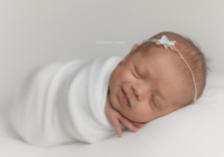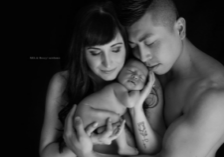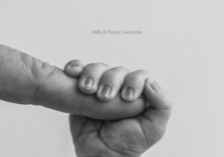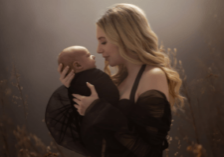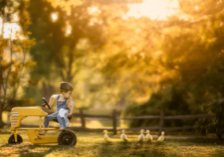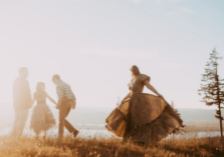Creating Balance & Ease in Your Photography Business with Dawn Potter
Whether you’re working with newborns, older kids, or even adults, you have to expect the unexpected in your photography business. Late show-ups, last-minute additions, extreme messes–as photographers, we just have to roll with it! And while you can’t prepare yourself for everything, you can create systems in your business that help your clients get comfortable and help you maintain your work-life balance.
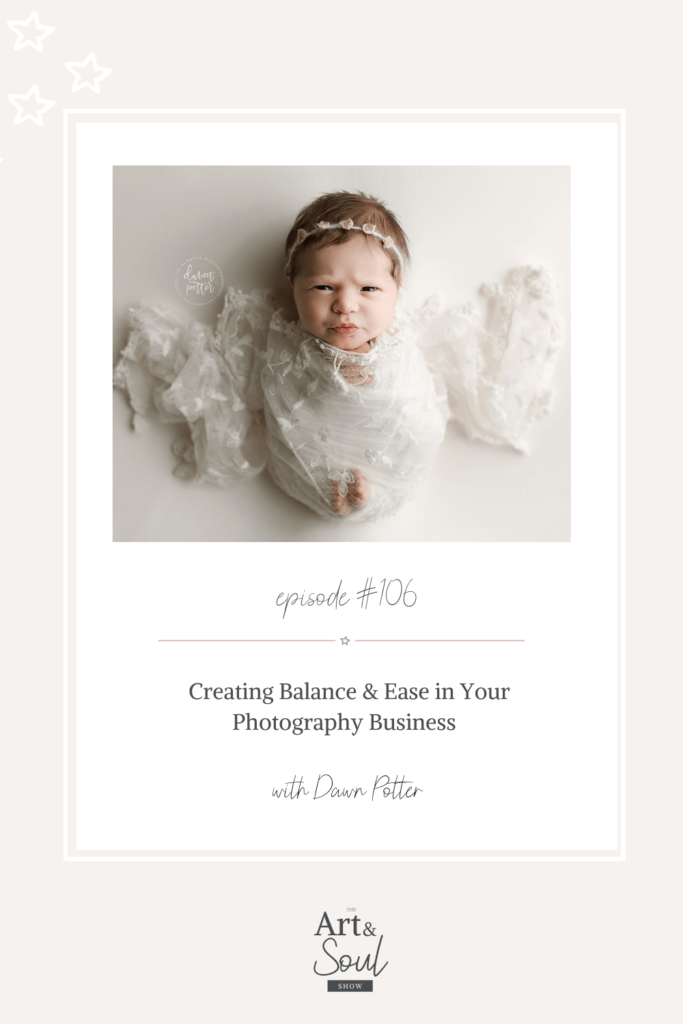
In this episode, I’m chatting with award-winning newborn photographer Dawn Potter about how she creates low-stress sessions for parents, babies, and herself in her photography business.
Dawn is sharing how she found her passion for newborn photography and how her business has changed over the years. She’s explaining how she plans low-stress sessions for both parents and babies and how she maintains a strong work-life balance. Plus, she’s opening up about her most memorable and unexpected sessions.
What’s in this episode:
- How Dawn found her passion for newborn photography [3:06]
- How to break out of the boredom when your sessions start to feel repetitive [4:55]
- Why you should find a balance between shooting for the client and shooting for social media [6:27]
- How to handle criticism and “trolls” in the online space [7:46]
- Why you should experiment with video content and behind-the-scenes on social media [12:17]
- Why photographers should value their work and their work-life balance [17:23]
- How to adapt your workflows to adjust for different scenarios with babies and families [20:07]
- Dawn’s most memorable sessions and clients [25:18]
- How to create a stress-free session for both parents and babies [29:40]
If you want to break out of the daily grind and pursue deeper connections in your own life and photography business, you don’t want to miss this episode.
SUBSCRIBE: iTunes | Spotify | Stitcher
Meet Dawn Potter
Dawn is an award-winning Seattle-based newborn photographer who started her business with a cheap DSLR camera and a makeshift home studio space when her youngest son was a year old. In addition to her photography sessions, she’s hosted and taught workshops and conferences in the US and Canada. She’s been recognized as one of Seattle’s best newborn photographers for the past six years. She’s also happily married with four kiddos, whose support has meant everything to her business.
Connect with Dawn
If you loved this episode you may also enjoy
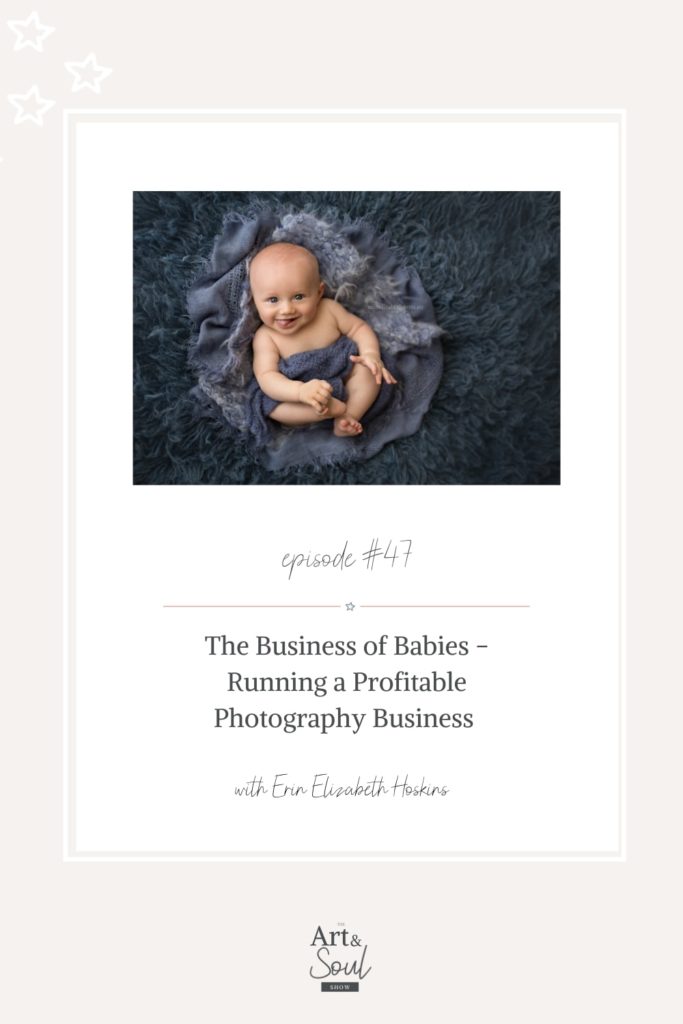
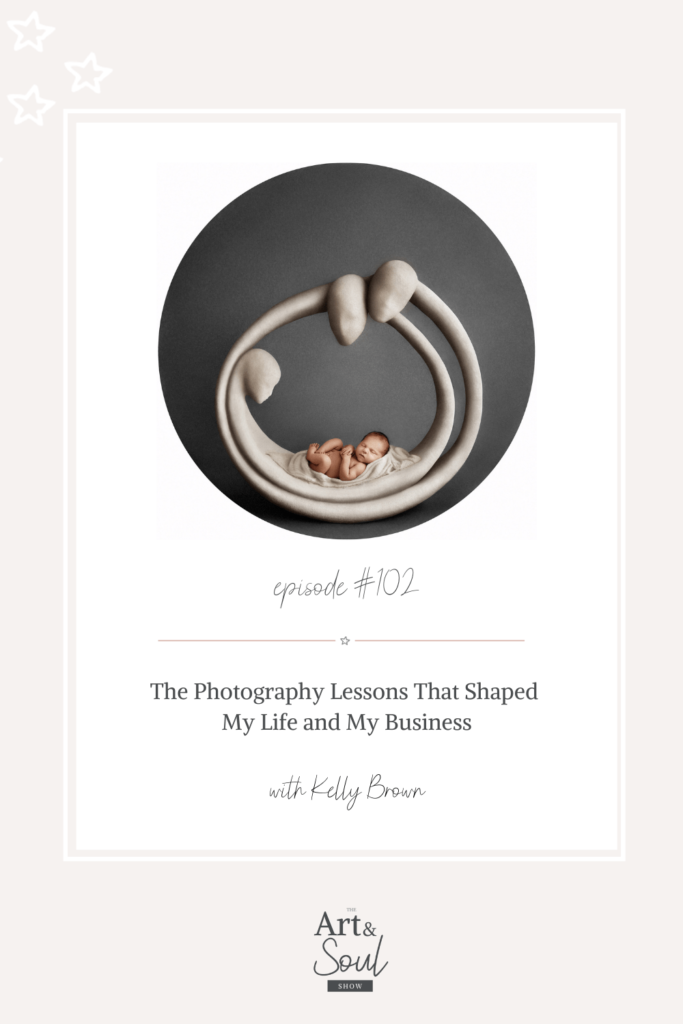
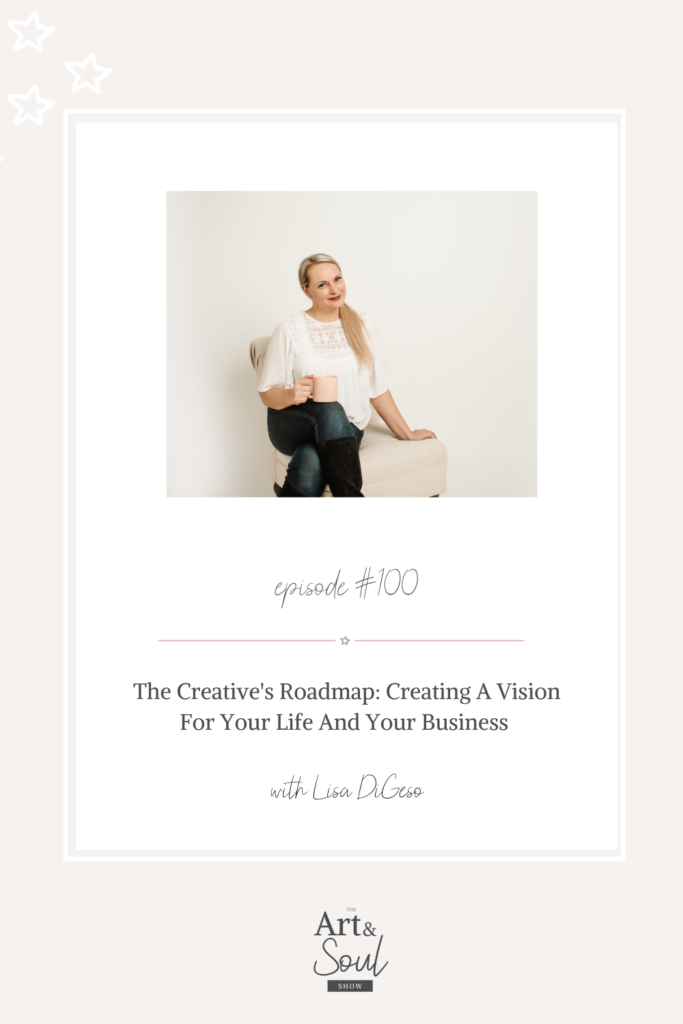
Transcript:
[00:00:00] Dawn Potter: I wish that more photographers placed a dollar amount on their value, their time. I think so many of us view our business as this, and I don’t want to say it as a hobby, right, but as a creative outlet and we really find joy in it. So it’s hard to separate the fact that it’s joyful from being something that also is actual work, physical work. So we get really lost in the job because of that reason and we neglect family time. We neglect household duties. Look at me I know no one else can say it.
[00:00:39] Lisa DiGeso: Yeah, so many things. Right?
[00:00:46] Lisa DiGeso: Welcome to the Art and Soul show where we dove into heart opening chats on photography, business life and that messy in between. I’m your host, Lisa Digicel, a mom, a photographer and entrepreneur, and I’ll be sharing honest conversations and advice for photographers with insight on mindset, entrepreneurship and creativity. The goal of this podcast is for you to be able to gain insights and strategies that will get you real results. Because let’s face it, having a photography business can be lonely, but it doesn’t have to be. This is the place you can go when you need a boost of encouragement, a kick in the pants and inspiration to pick up your camera. This is the art and soul show.
[00:01:29] Lisa DiGeso: Hello, my friend. Welcome back to the show today. I’m chatting with Dawn Potter. I absolutely adore this lady, and I’m so excited to dove into this conversation. So after having four children of her own, she looked at her husband and told him this was something that she had to do. It wasn’t realistic for her to keep having babies just so she could continue to experience the newborn stage. So she turned that passion into a business. It made sense for her to blend her love of art and creativity with her passion for babies. And that was nearly six years ago. This journey has led her down a path that she never could have imagined since having her own babies. She’s photographed hundreds of babies, has won awards, and she’s one of our amazing instructors for the online newborn retreat. I am so excited to dove into this conversation with Don. Without further ado, let’s get started. Hello, my friends. Welcome back to the show. I’ve got Dawn Potter on today. Welcome.
[00:02:26] Dawn Potter: Hi, how are you guys? It’s good to see you, Lisa.
[00:02:30] Lisa DiGeso: Good to see you, my friend. So for those who haven’t met you yet, can you share who you are and what you’re passionate about?
[00:02:36] Dawn Potter: My name’s Dawn. I am a photographer in the Seattle area. I would say. For anybody who’s not super familiar with geography, I’m up in the Pacific Northwest. I specialize in newborns. I photograph newborn, maternity, some first year and some family in the summer. But maternity is probably or I’m sorry, a newborn is probably my biggest genre.
[00:03:03] Lisa DiGeso: I love that. So how did you get into newborn photography?
[00:03:06] Dawn Potter: Oh gosh. I actually started my business about eight years ago. My husband and I were having our fourth child. I had begged him for years for us, for a camera. I think we all kind of went through that a little bit like, Oh, I want a fancy camera. If I have this fancy camera, I’m going to take these pictures. I finally convinced him to buy me this camera, and it was so funny because he just thought, Oh my gosh, this is another thing that’s just going to cost us money that you want to do. But I convinced him to buy me this camera, and once I had it, I played with it. I played with the babies. I got my hands on every baby I could think of. And I really kind of sat with that for a little while before I decided to start a business. I wanted to make sure it was something that was worth my time, something that I really, really enjoyed doing. And I’ll tell you what it’s really about the babies. For me, I just absolutely love babies.
[00:04:00] Lisa DiGeso: I have a very, very similar story. I remember, like I said to my husband, I was like, I really want to get a camera because he wouldn’t let me get newborn photos at the time. And so I saved up all my money, saved up my mommy money. Finally, for Valentine’s Day, I was still like five hundred dollars short. And he’s like, We’re going to go get your camera. You’ve been talking about this for like six months. So we got my camera and he’s like, So you think you’re like, What do you think you’re gonna be a photographer now? And I was like, Oh, game on, game on buddy, challenge accepted.
[00:04:31] Dawn Potter: Yeah, yeah, that’s right. I think a lot of us probably have similar stories, right?
[00:04:37] Lisa DiGeso: So I mean, in his defense, I did have a history of starting businesses that most were not successful. So yeah, that’s kind of where that was coming from.
[00:04:46] Dawn Potter: But yeah, yeah. But look at you now, you just had to find your groove.
[00:04:50] Lisa DiGeso: Find the right one. And that’s where many of our story listeners and students feel that way, too. So I know for me personally, when I’m running my sessions the same way, I do have a tendency to start feeling a little bit bored in the little uncreative. Sure. So what advice do you have when sessions start to feel maybe a little mundane for you?
[00:05:10] Dawn Potter: Oh gosh, you know, it’s so funny because I hear photographers talking about that, and I don’t know what the answer is. I probably am one of the most mundane shooters because I shoot with the same props. I shoot with very similar backdrops all the time. I run through the same session flow. I do the same poses. I don’t get that way. I don’t get bored. I don’t. I haven’t found a point where I’m feeling like that overwhelming sense of here we go again. I think probably that could have something to do with over shooting if. Somebody is taking on too many sessions or they’re not charging enough money. If you feel like you’re kind of going through this mundane, you know, flow, it could be one of those two things. But let’s say it’s not. Let’s say you’re priced great and all that. I would say to take on some project, whether it’s a model that you shoot for free and you just break out all the colors you would never shoot with, or perhaps that you never use poses you’ve always wanted to try that aren’t part of your work. So that could be a really good way to reinvigorate things for yourself if you’re finding that you’re in a rut. I would say to do something like that, I love it.
[00:06:27] Lisa DiGeso: Do you find that you mentally like you are so mindful about who you’re shooting for that you’re shooting for the client, you’re shooting for that new baby and that experience versus what to post on social media and shooting for other photographers? Do you find that that comes into play for you?
[00:06:43] Dawn Potter: You know, it’s actually interesting that you say that because I I shoot very consistently and repetitively to create a similar client experience for all of my clients. But I actually also intentionally shoot for social media. I have found that social media has been a big, a big turning point for not just finding clients that want to hire me, but also finding photographers that are looking to further their education. So I do both. I shoot both during a session. I make sure to take behind the scenes during a session for that very reason. That’s kind of the social media aspect of it. But I’m also shooting for the client’s wishes that I’m delivering to them the products, the end result that they’re looking for. So it’s kind of twofold for me.
[00:07:30] Lisa DiGeso: I love it. I think I think that if you have it in mind where you’re able to do both. That would also help in keeping things feeling fresh to you because you are creating something absolutely something for you to something that absolutely you up.
[00:07:44] Dawn Potter: Yes, it’s a big, big part of my shooting process now.
[00:07:48] Lisa DiGeso: I love that. So I know that recently you’ve been blowing up on TikTok and you’ve been getting some haters and some trolls coming out of the woodwork. And I think that many photographers really have that fear, so they don’t post at all. So what advice do you have on dealing with them and not taking them to heart?
[00:08:07] Dawn Potter: You know, it’s so funny because we are all artists. We all view our business that we create as something so personal. You see it all the time in different forums, you know, people that get down on themselves because their friend had a baby and they hired somebody else or whatever it might be. But criticism is definitely a big thing because we’re always so critical of our own work that hearing it from other people can be a real test of our ego and our self-worth. Actually what’s funny is I definitely was a little blindsided at first. It happened on my Instagram before it happened on my Tik Tok. I posted in my stories because the stories are a great way to get your followers engaged. I posted in my stories, What are you guys doing? What are we doing with these comments? The negative comments that come in? And I got some really great feedback. I got some people that definitely said, Oh, don’t listen, your work is great. And this and that, which is always awesome to hear words of encouragement. But somebody’s private messaged me, and this was kind of a game changer for me, she said. You know what? I don’t block them. I don’t delete them. I comment back, or I use it as fodder for my next post because it’s engagement. At the end of the day, people commenting on your. It happens mostly on my reels. People commenting with negative comments are just making your reels, get more action. They’re getting more visibility, they’re getting more engagement. And at the end of the day, it’s such a small percentage of people that leave negative feedback that it has created an opportunity for me to make more reels and make more content and get people talking. So I think that that’s probably the best way to handle it. You can delete it if you want to, and you can block those people, but I use it as an opportunity to increase engagement.
[00:10:10] Lisa DiGeso: I love it. And so how do you not let that affect you personally?
[00:10:13] Dawn Potter: Well, truthfully, the people that are commenting, the things that they’re writing, I think, really don’t know what we do. They don’t understand newborn photography. They don’t understand, you know what it is we’re delivering for our clients. It’s just something that’s different for them. So that’s that’s really all. I just chalk it up to ignorance.
[00:10:35] Lisa DiGeso: Yeah, I love that. And I think that’s a great approach.
[00:10:37] Dawn Potter: You know what? I actually had a client, a photography client that came into my studio. She picked up her order last week and she told me. She says to me, I am so sorry about all that negative comments that you’re getting on your reels. I tried to report all of those comments. I just want you to know, but I don’t think it’s any good. Yes, it was so sweet. And she said, I just wanted them to know that, you know, there are people that are actually paying you to do this stuff and that it really matters to people and then it is a big deal. And I thought, Oh gosh, you’re so sweet and I love you for all of that. But it’s it’s really it’s really. We have to, you know, if somebody is getting really personal with you and it’s really bringing you down, then you shouldn’t look at the comments. I don’t even read my TikTok comments because the TikTok ones are really weird. They’re out there. Yeah, really weird. So I just don’t even read those ones. Yeah.
[00:11:28] Lisa DiGeso: Yeah, that’s good advice. That’s good advice. I joined TikTok in August and I’ve had a few TikToks that have gone viral. And so I’ve had some interesting like, Oh, and I was like, I might be doing this. Like, I’ve been on social for like 10 years and we’ve had some crazy ones, but I was ill prepared for TikTok and some of the comments on there. So I was always curious because I was like, Donal, no, I don’t know how to deal with this. So just like, slough it off.
[00:11:57] Dawn Potter: And you’re yeah. And truthfully, your audience will fight your battles for you too. Yeah, I mean, I’ll have somebody post something, you know, comment something on TikTok and then I’ll have other people that will comment on their comment and tell them off. So I just sit back and again, it’s creating engagement. It’s getting more visibility. That’s all that matters.
[00:12:17] Lisa DiGeso: So do you find you’re creating different content for Instagram versus TikTok or repurposing?
[00:12:23] Dawn Potter: I’m not repurposing, but I am using similar things. So I yeah, I have. I’ve done it a few different ways. I’ve created videos and TikTok and then saved the videos and used those to upload without the TikTok logo. There’s a way to do that. I’ve created reels and saved the reels and those saved without audio, and then I’ve uploaded those to Tik Tok and added audio. But at the end of the day, I usually just take snips, similar snaps and upload them and then add the audio inside of the app. I don’t know if it makes a difference with the algorithm, but that’s how I’m doing it. It’s really not that much more time consuming. I make a point of spending my time more on Instagram, though I have a much bigger following on Instagram. I receive daily inquiries from people finding me on Instagram, so I feel like that is a better use of my time that’s going to yield results. So that’s the only social media platform that I really focus my time on. And then leftover stuff goes to TikTok or even Facebook. I don’t know if you know this, but Facebook has reels as well. Mm-Hmm. That the Instagram Reels filter into Facebook. But Facebook, you can also create reels inside of Facebook, and those reels get shared separately from the Instagram Reels. I know there’s just there’s so much, there’s so many, there’s so many. There’s YouTube shorts too.
[00:13:47] Lisa DiGeso: Yes, I know.
[00:13:48] Dawn Potter: Video is like, people are scared of it. I get it. I know people don’t want to do reels. My Instagram blew up when I started. I mean, it blew up when I started posting Reels. It’s just so important.
[00:14:01] Lisa DiGeso: When you are doing a session. So how are you? Are you videoing the Reels yourself during a session or the TikTok during a session? Or do you have an assistant doing that if the parents are doing it? How do you engage with your clients? So they’re like on board with it?
[00:14:15] Dawn Potter: My clients are not in my reels. They are not in my videos. I mean, the baby is, but the parents are not. Yeah, I don’t share babies names or anything like that on my social media because of anonymity and even more so with negative comments, right? So no clients are being tagged. I have a GoPro. It’s actually, you know, GoPro. I attach this to my light stand because wherever my light is facing, my camera’s facing and that’s going to be the angle that I want to be shooting, right? So I’ll take a snip on my GoPro, a video of me doing a post, handling the baby or something like that. Just a short snip, maybe 20 seconds. And I’ll even cut that down. And then I’ll usually pull my phone out and I’ll take an angle directly onto the baby. And then I’ll typically upload a final edited photo on top of it. So I layer those all together. Clients are signing a model release as part of their session contract, so unless they have specifically excluded the model portion, that’s just what I do. I just take those steps and I do it throughout the session. So I’ll take, you know, three or four clips during a shoot and kind of mix those together so that I have content to create if I want to use any of it.
[00:15:27] Lisa DiGeso: I love that. I think it’s so great. I recently had Corinne, who is amazing. She works for us with the Milky Way, but she’s been coming and doing behind the scenes for me during my sessions. And it’s just like a game changer and my clients are super into it because then I can take parts of it to that. I do on my phone and I’m making them into like these memory memory reels for them so I can use them, right? So it’s kind of a multipurpose thing. So it’s just been an interesting way that I can teach. But also, I can, you know, it’s like a gift for them to absolutely suspend. Yeah. It’s just like and a funny thing is done. Like, I resisted reels and video so hard until that one day that I figured it out. I can put whatever music I want pretty much on this. And I was like, Oh my goodness, this is my jam. Like, This is my, it’s my zone. So it’s and it’s been really fun.
[00:16:24] Dawn Potter: So, yeah, good. I know you’re not the only one. A lot of people resist it. A lot of people don’t want to be on camera. They don’t want their face on the camera, they don’t want to put their points out there or whatnot. And I mean, I’m not any different. I’m super introverted. I hate being in groups and all of that. So like anything else, it just took practice. You just have to do it right, get over, just get over the hump of it, because I think people really want to see your face and they really want to connect with you outside of just your beautiful imagery, right? Yeah.
[00:16:58] Lisa DiGeso: And the funny thing is we owe it to social media. It’s always like, like, I want this to go viral. Oh, I’m sad because I only have this many looks on it. But like, you never think what happens if I do go viral? Like, Oh, am I going to handle that right?
[00:17:15] Dawn Potter: Yeah, that’s true. There are some people out there that it’s not been great for. So now I feel a blessing and a curse.
[00:17:23] Lisa DiGeso: It is. So what do you wish more photographers knew?
[00:17:28] Dawn Potter: What do I wish more photographers knew? That’s a really broad question. Anything like specific
[00:17:34] Lisa DiGeso: about. Hmm. I like Work-Life Balance. Let’s go work life balance. What do you wish?
[00:17:41] Dawn Potter: That’s a great picture now. Yeah. Well, I guess artists speak on that a little bit more generally. Like you initially asked. I wish more photographers knew their value. I wish that more photographers placed a dollar amount on their value, their time. I think so many of us view our business as this. I don’t want to say it as a hobby, right, but as a creative outlet, and we really find joy in it. So it’s hard to separate the fact that it’s joyful from being something that also is actual work, physical work. So we get really lost in the job because of that reason and we neglect family time. We neglect household duties. Look at me I know no one else can say it. There they are. Yeah, so many things, right? But I wish there was a magic number for it. I wish it was like a simple process of Oh yes, we should be making X amount of dollars. And if that’s the case, then everybody is the same whatnot that I do. I guess I kind of wish people valued their time a little bit more because it’s really worth something in it. It makes me sad to see people selling themselves short and doing work for pennies. I mean, almost like they’re paying people to work at some of these dollar amounts that they’re charging. So to the point of work life balance. Setting a schedule is so important. I never work 40 hours a week. I mean, maybe every every once in a while. But you know, my kids go to school at nine a.m. and the earliest group comes home at two to forty five. Actually, he’ll be home fairly soon here. And so it just kind of makes my day in between those hours really short. And I don’t like to be working at night. I don’t in fact, I won’t sit at my computer. If it’s dark, it’s dark outside. I can’t be at the computer, I can’t edit in the dark, so I don’t work late nights. I don’t work weekends. I’m only really working when my kids are in school, sometimes a little bit later in the day, just kind of depending. But it’s important to prioritize your home life and your family life in front of work because you would expect that for yourself if you were working a nine to five corporate job to me, you would say to yourself, family’s important and you wouldn’t miss birthdays and you wouldn’t miss those important events. So you shouldn’t do it when you’re running a business, either.
[00:20:07] Lisa DiGeso: That’s great advice. Now you mentioned that you have a pretty much the same workflow for every session. So do you change up your workflow when your session starts to go sideways?
[00:20:18] Dawn Potter: Yeah, so workflow. I have a set of four workflows, really. Yeah, I have a parent posing. I have a sibling posing, so I have a wrapped posing flow and I have a beanbag posing for. So depending on if I’m photographing families or siblings, that might change. The order of those different posing clothes might change from one session to the next. So if a baby comes, let’s say I’m not photographing the fam. And so I’m just only going to do the baby. Normally I would start a baby on the back if that baby is not content and doesn’t want to be naked if my studio is not warm enough. Multiple different things could be happening. I might jump to the rapt portion and try wrapping the baby and shoot wrapped in props and then try to go back to the beanbag. So I think it’s important to be kind of on the ball and able to switch things up. But I have all of my props styled before they come. All of my fabrics are laid out, and all of the accessories I’m going to use are all pre-selected and ready to go at the start of the session. So I just kind of grabbed it from there and will adjust. And you have to read everything is different, so you have to read their cues and kind of follow what their direction is that they’re leading you. But for the most part, I’m pretty stubborn. Also, I will take time and be patient and try to stick with something before just kind of jumping ship. It’s really about everybody’s got a different personality and it’s whatever you’re you yourself are comfortable with, right? If an awake baby stresses you out, or if the baby being upset is stressing you out, then it’s probably good to do something that’s a little less stressful, like wrapping them up or moving on from whatever pose you’re trying to get. But yeah, so I would say it’s a case by case basis. Sometimes I have to abandon ship and go a different direction, and I’m I feel like I have enough experience that it’s fairly simple for me to do that if I need to.
[00:22:18] Lisa DiGeso: Yeah, I love that. Yeah, I had a session, I guess, a couple of days ago and my client messaged me because normally I do my family images of the very end and she’s like, I have bangs and I know your studio is going to be hot. Is it anyway we could do the family person like this is their first child family, you know? All those images at the beginning and I was like, Yes, and making it does. I love it. I loved it so much because I was able to do so many different posts. I was like, I want to do this person, this person, this person, this pose. And I was like, it was like a brand new session meant, like it was just mixing that up. Oh, my goodness, that was fun.
[00:22:57] Dawn Potter: Yeah, I used to do family at the end, and then I moved them to the beginning and I thought, Oh my gosh, this is so much better because I thought doing them at the end was better, giving the parents a little more time to get settled. But really, if you’re just giving them time to sweat?
[00:23:10] Lisa DiGeso: Yeah, I know, right?
[00:23:13] Dawn Potter: Yes. I mean, I’ve had parents show up with a baby that was a different gender than I thought, Oh my gosh, right? Yes. So I try to do something I’ll set up, you know, or I’ve had a parent show up with a toddler that I didn’t know was coming, that you have to kind of be ready to go there, too. I changed things a little bit since then so that that doesn’t really happen to me any more. Well, the gender thing can still happen. Yeah, I lose my mind sometimes, especially if I’m reading through that questionnaire and I’m like, Oh, they want to use these colors? And then, you know, it’s silly, but sometimes I will look at that and think, Oh, that must mean they’re they have a boy or they have a girl, but it doesn’t mean anything. Ah, no, not at all. So those things definitely happen to me, too.
[00:23:57] Lisa DiGeso: Yeah, totally. I had a session. Oh gosh, it was a little girl. Her name was James and like-
[00:24:02] Dawn Potter: It’s so cute.
[00:24:05] Lisa DiGeso: And they’d requested gray and waited. And I was like, So I completely set up for a boy. And then I was like, You know what? I’m just going to throw in some headbands in here, and it’s totally like, we’re aces. James looked amazing in it. I bet. But there was another time I stood up for lots of pinks, lots of pinks and a little baby boy arrived.
[00:24:25] Dawn Potter: And he didn’t want pink?
[00:24:28] Lisa DiGeso: So I quickly pivoted. And yeah, yeah, yeah. There’s also a time years ago that I had a client show up on the wrong day and like, I didn’t have the studio heated. The studio was actually messy from the day before, like, Oh no. And so it’s like, This is, gosh, this is probably about eight years ago at this point. But yeah, no one taught me. I always clean my studio after my session.
[00:24:50] Dawn Potter: Right?
[00:24:51] Lisa DiGeso: Number two, yes, I triple check and with texts, with everything, just making sure that they have the right dates. They don’t show up a day early, right? Yeah, that’s what it is. I ended up doing the session that day anyway, didn’t send her away, but –
[00:25:03] Dawn Potter: Oh, that was nice of you, right? I don’t want to send her away. Yeah, that was nice of you.
[00:25:07] Lisa DiGeso: Yeah. But that’s the thing, though, it’s those lessons and the things that we think that are like failures or mistakes are the things that are actually the big learning points that create.
[00:25:16] Dawn Potter: A hundred percent process,
[00:25:18] Lisa DiGeso: Right? Yeah. So what has been your most memorable session and why?
[00:25:23] Dawn Potter: Oh gosh, that might be a tough one. You know, I have this one. It’s kind of funny because I was really early on in my life. This isn’t anything great. This is just a funny story, but it does kind of stand out to me. Well, I have a couple. OK, we’ll start this one because this is a funny story that I tell a lot of people. Babies poop and pee happens all the time. It’s. Really unavoidable. The only way you can really prevent a mass is if they’re in a diaper 100 percent of the time, right? So I had the session early in my business and I had a home studio. My home studio was like a 10 by 12 room. It was very small. And it was a mom and a dad and a daughter that I think she was about four or five and then their new baby. And they came in and this baby was and I want to say, she was 10 days old. I don’t shoot 10 day olds anymore. I want to say she was 10 days old and she didn’t stop pooping. And we tried to do the family photos with the baby naked, and she just pooped and pooped and pooped and pooped, she pooped on every outfit that the parents had brought. She pooped all over the room. My, my spare bedroom. My studio was carpeted. I had to break out the carpet, shampoo her and shampoo the carpet. I had to wash my cream, Cardi. I mean, it was a total. It was so bad that I rescheduled the session because she wouldn’t stop pooping, and I was too new to figure out like, let’s put a diaper on the baby. I don’t know why, you know, right?
[00:26:49] Lisa DiGeso: Because, yeah, they’re supposed to be naked, but you’re supposed to do it this way, right?
[00:26:53] Dawn Potter: Yes. Yes. And I also just thought, Well, she can’t possibly poop anymore. There never was. It never came to an end. And it’s one of the only sessions I’ve ever rescheduled but I did reschedule them. And she came back and I asked, I asked one of the newborn groups that I was like, What do you guys do when this happens? And they said, I just have a diaper on them and I thought, Wow, this is like the most genius information ever. But that baby girl, God bless her. She proceeded to continue like even though I rescheduled. She pooped and pooped and pooped again. But this time I was smart enough to, like, have her diaper. But anytime clients ask me like, Oh my gosh, you get so embarrassed or something when a baby poops or pees and I always tell that story and then they kind of feel better. So that session, you know, seven years ago, still totally stands out in my mind, and that’s probably like the biggest one. But another one that was really cool was we had a local but not photographer, sorry and local sports team pro sports team that a photographer, a photographer, a client booked me and the name that’s used in the booking. I had no idea that she was married to this pro athlete. And it wasn’t until the night before the session when I messaged her to confirm that she told me that her husband played for the Seahawks and that he couldn’t be there because of practice and this and that until a certain time. So they were going to come with the baby and we’re going to start this. The session ended up being five hours long, and it was the mom and the baby and her daughter that came with the older daughter. That was six, I think. And then the grandparents on both sides of the family were there. And this is the longest I’ve ever been in a studio with a client and they were there. We were there for five hours until dad was finally able to make it. And it was amazing. Like, this family was just so cool and so awesome, and spending the day kind of getting to know them. And just kind of, I mean, we were just sitting back like sitting around this my studio at the time, just chit chatting the whole time because I wasn’t going to send them away. And it was just kind of cool to like, get to know somebody, you know, that was really famous on a deeper level. And that was a pretty cool thing, too. I love that. That’s so yeah, that’s good. Yeah, it’s fun. It was fun.
[00:29:15] Lisa DiGeso: It’s like we meet so many cool people in this industry, right? Oh yeah. So it was that was that like the most famous client you had?
[00:29:22] Dawn Potter: Yes, definitely. Yeah. And I saw them a few times. They had another baby a year later, so I did have another newborn session for them and I did a milestone or maybe even two other milestone sessions for them over the course while they were still living here. But definitely the most famous person. Yeah. Very cool. Yeah.
[00:29:40] Lisa DiGeso: So are there any special touches that you have that you make for your clients that make your sessions unique?
[00:29:46] Dawn Potter: I don’t know. I I don’t really know what, what other people do that I could really compare to, but I like to have my session be a stress free event for the parents. I generally don’t schedule until babies are a couple of weeks old because I like to give them a little more time to settle at home, acclimate to life with a newborn, give them some time to kind of rest and recover. And so they’re not totally drained and exhausted when they come in for the session. And then I do everything, you know, unless the baby needs to eat and the baby’s breastfeeding. I usually will even take a bottle and feed the baby if the parents need kind of a reprieve. It’s nice for them to have this person that they don’t even know usually that they trust with their child kind of taking the reins and letting somebody else handle things for a few hours. And I, you know, I provide a little. Nice size sitting area. And they’re welcome to sit near me when I’m shooting, but it’s a big studio, so there’s space for them to spread out if they want to. I have snacks and coffee and cold beverages and they’re welcome to bring in food and beverages too, if they want to. But I also kind of provide all of that so that they don’t have to do too much. I mean, I don’t know how unique that is. It’s just really being a good person like that, just giving them an opportunity to rest and relax and not not be stressed out about anything. I think it’s really important it’s hot in there, right? So we don’t want our clients to be so overwhelmed with everything that’s happening that they’re stressed out. It doesn’t help for a good session, either.
[00:31:27] Lisa DiGeso: All right, you ready for the lightning round? I will give it a try, right? Coffee or tea?
[00:31:36] Dawn Potter: Coffee.
[00:31:37] Lisa DiGeso: Craziest thing on your bucket list.
[00:31:39] Dawn Potter: I don’t have anything on my bucket list, probably traveling internationally. I suppose that’s so crazy, especially now.
[00:31:46] Lisa DiGeso: You know, what’s the worst thing you did as a kid that you got away with?
[00:31:52] Dawn Potter: I was a good kid. I probably picked on my sister a little too much. Yeah, that’s probably the worst thing I did.
[00:31:59] Lisa DiGeso: I love it. Well, it’s something you have been proud of yourself for lately?
[00:32:04] Dawn Potter: I’m really proud of how my business is doing, really proud. And anybody who is surviving this COVID climate really should be as well because this has just been such a roller coaster for so many people. So if you are still in business and your business kicks in, then I think that you should all pat yourselves on the back for it because that’s a big deal.
[00:32:24] Lisa DiGeso: Most luxurious vacation you’ve ever been on?
[00:32:27] Dawn Potter: Probably. When I went to Mexico a few years ago with my husband, we stayed at an all inclusive resort. It was before the pandemic, so we got to do all kinds of fun activities. And yeah, that was amazing. We pampered ourselves.
[00:32:41] Lisa DiGeso: What was your favorite TV show as a kid?
[00:32:43] Dawn Potter: As a kid? As a kid, I watched a lot of Sesame Street as an adolescent youth. I loved 90210 and Melrose Place. Oh, yeah, yeah, those shows are great, and I was probably like 10 when those came out. So they were a year old for me. And then in high school, I was all about Friends.
[00:33:02] Lisa DiGeso: Yes. Love it. Love it. Love it. Last thing you did for yourself as an indulgence?
[00:33:07] Dawn Potter: That is a tough one. I mean, I recently got into OK, so I used to have lash extensions and I started having issues with the lash glue. So I recently got into this thing called lash fire, which are these like little deals that got me through-
[00:33:24] Lisa DiGeso: It got me through the pandemic. It got me through the pandemic.
[00:33:27] Dawn Potter: I love it. Yeah, because in the pandemic, you couldn’t go get lash extensions. So I couldn’t have lash extensions because I was having issues with the glue. So I just recently splurged on a bunch of Lashify lashes and I’m like, I’m kind of hooked. It might be. It might be a guilty pleasure. Yeah, that’s definitely a self-indulgent thing.
[00:33:46] Lisa DiGeso: I would. I love it. How long do you find that they stay on for you?
[00:33:49] Dawn Potter: I take mine off at the end of the day. I was thinking, Yeah, well, you don’t have to. That’s the cool thing about that product that you can leave them on for like a week. And it’s not that big of a deal, but I’m really I mean, I don’t wear any makeup and hardly ever speak. The lashes thing is a big thing for me. It’s kind of fresh, especially because we’re masking here. So I like to have my lashes. It is definitely a thing, but I take them off every day because I rub my eyes too much of it for you.
[00:34:19] Lisa DiGeso: And I was brutal. I was like, I’m like, I’m going to put this back on and five days. So, morning person or night owl.
[00:34:30] Dawn Potter: Night owl. I hate waking up in the morning. If I could sleep in every day, I would sleep until 10:30.
[00:34:36] Lisa DiGeso: What did you want to be when you grew up?
[00:34:38] Dawn Potter: When I was really young, I wanted to be like a lawyer. I was super into debate in school and stuff like that. Speech class was just so funny now because I feel like I’m terrible at speaking. But then, as I got to be a little bit older, I wanted to work with children. I actually took a lot of classes through high school and into college that were child psychology related. I had not the best childhood and upbringing, and I guess something about working with kids really spoke to me. I never wanted to be a photographer. I never did it. So funny. Yeah, I love babies.
[00:35:20] Lisa DiGeso: It’s the babies. What’s for dinner tonight?
[00:35:21] Dawn Potter: You know, I made a big batch of clam chowder about an hour and a half ago, and my husband and I had a bowl for lunch and we will probably eat that for dinner, too, because it’s not that bad. And it’s the little-
[00:35:32] Lisa DiGeso: Red or white?
[00:35:33] Dawn Potter: I do both. I like red wine. I love rosé, too. I do both. But I have found that red wine makes me a little congested, so I can’t really drink as much as I would love to. So I’ll kind of go with white sometimes for that reason, I
[00:35:54] Lisa DiGeso: I love it and I love to end my interviews with this last question. So what are you currently curious about or artistically curious about?
[00:36:03] Dawn Potter: I’ve only ever photographed. I photographed singles and I photographed twins, and I would love to photograph a bigger batch and multiples like triplets or quadruplets. I really am. I would be curious to see how a session like that would work and how I would be able to pose babies. I think that would be a big challenge, and that’s something that I would love to do at some point.
[00:36:27] Lisa DiGeso: Love that.
[00:36:28] Dawn Potter: Thank you, Lisa. It’s great being here.
[00:36:31] Lisa DiGeso: That was such a fun conversation with Dawn. I swear we could just talk for hours. And I love how we were able to just chat on dealing with trolls and haters and just negative criticism on social media and not taking it personally. I absolutely loved the advice of just using it as something to boost the algorithm. What a great way to look at it. I am sending you so much of my life and my love today and every day. We’ll see you next time.
share the love
[Sassy_Social_Share]
recent
Podcasts
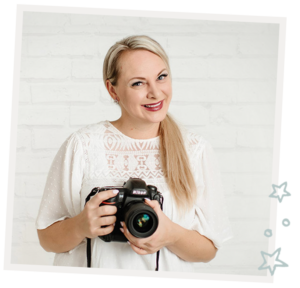
I'm
Lisa DiGeso
I’m on a mission to create uplifting online experiences for photographers ready to elevate their art, their business and their mindset.(...and have fun along the way!)













